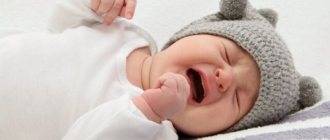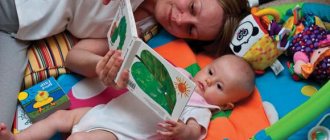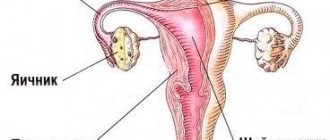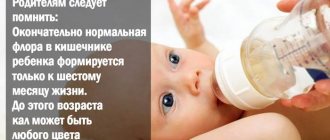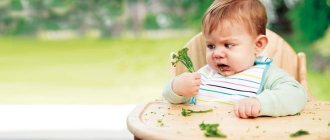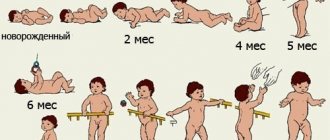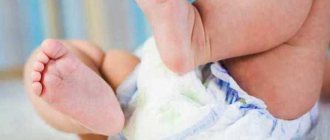Why is my baby drooling?
Popular wisdom says: if a baby starts drooling, teeth will soon appear. However, doctors do not share this statement, despite profuse salivation at 2-3 months, the first teeth usually appear after the sixth month.
Should you rush to the doctor and look for problems in excessive salivation?
Why is saliva needed?
The baby's salivary glands are capable of producing saliva while still in the womb. A couple of months after birth, saliva production increases significantly. Thus, nature took care of protecting the child’s body from various infections that enter the mouth.
Another useful quality of saliva that is worth noting is the breakdown of starch into sugar thanks to the special enzymes included in its composition. This property has a positive effect on the digestion of food that enters the baby’s stomach. And less painful teething is also her merit.
Salivation increased
Despite the above, there are times when increased salivation is worth paying close attention to. Drooling in a 2-month-old baby may be more likely due to a runny nose than teething. If the baby, while salivating profusely, also breathes through his mouth, this may indicate a nose clogged with snot. If there is no runny nose, but the baby is drooling, why not examine his mouth to rule out the presence of ulcers or inflammation of the oral cavity.
Closer to 6 months, the baby’s salivation may actually increase, this will be the first evidence of the imminent appearance of the first teeth. By effectively wetting the gums, saliva reduces the pain caused by teething. During this period, pay closer attention to dry clothes - frequent changes of blouses and the use of a bib are more relevant than ever. More details about the developmental features of a 6-month-old baby?
If irritation appears on the chin from excess moisture, it is necessary to lubricate the baby’s delicate skin with cream with vitamins A or E several times a day.
Don’t forget that a 3-month-old baby’s drool is flowing like a river also because he doesn’t know how to swallow it, and his parents think his salivation is increased.
When to rush to the doctor
If the baby is characterized by excessive salivation, mothers may hear: wheezing in the chest or a strong cough. In this case, to exclude a viral infection, you should contact your pediatrician. If coughing and wheezing are associated with the fact that a 2-month-old baby’s drool is flowing, but sometimes it accumulates in the larynx, it is enough to place the baby on the tummy more often.
If you suspect inflammation, stomatitis, or thrush, you should rush to see a doctor due to increased salivation.
After examining the baby, the pediatrician will answer why the baby is drooling. Sometimes harmless drool can be behind very serious diseases. This may be hypersalivation - increased salivation, which is associated with damage to the central nervous system and even with the presence of mental illness. A head injury or the presence of a brain tumor can lead to excessive salivation.
Do not be afraid of increased salivation; most often this is simply a physiological feature of the baby. Sometimes there are the opposite cases - lack of saliva. Not many children suffer from high fever during the period of teeth growth, but still there are cases when the temperature rises above 38-39 degrees. This may also be due to a lack of salivary fluid. Don't worry about this, but be sure to consult a doctor. You may have to spend several days in the hospital under the supervision of doctors.
If your baby is drooling like a river at 3 months, rule out factors that require medical intervention, buy bibs, stock up on disposable napkins and teethers, and wait until the baby outgrows it. Please note that this healthy physiological process can accompany a child for up to one and a half years.
Useful video about teething timing
Saliva flows: what to do
Parents who are faced with the problem of hypersalivation in a small child should take the necessary measures to reduce the severity or eliminate this phenomenon:
- If you have thrush, wipe your gums and tongue with a soda solution. To do this, you need to dissolve a teaspoon of soda in a glass of water and wet a clean gauze with the resulting product, after wrapping it around your finger. This makes it more convenient to treat the oral cavity. Repeat 2-3 times a day until symptoms disappear completely. This treatment will reduce increased salivation in infants.
- When a newborn drools, he often experiences severe irritation around the mouth and chin. In this case, parents should be sure to wipe these areas with soft cloths. You should not rub the skin too much, so as not to increase redness and cause infection; movements should be careful. Several times a day before resting at night, you should lubricate the skin around the nose and chin with a special cream to eliminate irritation from drooling in the baby. Clothes should be protected with a special bib.
- If the problem is that the child is developing an allergic reaction, then he should be shown to an allergist. The first step is to find out the cause of the allergy. This could be animal hair, house dust, or the result of exposure to detergents or detergents for washing clothes and linen. Once the cause is identified, it should be eliminated immediately.
- You can help your child with teething. There are various topical gels for this purpose. They reduce inflammation and the severity of pain. But before use, you should consult your doctor.
Increased salivation (hypersalivation) in infants under six months of age can be considered a physiological phenomenon. The salivary glands secrete a secretion that protects the baby from the penetration of various viruses and bacteria into the body. This is especially important at a time when an inquisitive baby is literally exploring the world around him.
If the problem occurs in children older than six months, then such a symptom can already be considered alarming - it is quite possible that the baby suffers from a fairly serious illness and needs medical attention and examination.
Is your 2 month old baby drooling? No reason to worry
A huge number of young parents are frightened and worried that a child who has reached the age of two months begins to drool. Caring parents look for the cause of this phenomenon in medical reference books, considering increased salivation to be a symptom of diseases or disorders of any processes in the child’s body. But in fact, worries and worries are completely groundless.
2 month old baby is drooling
On the contrary, you should be concerned if by the third month of life the child has not drooled. But let's try to figure out why children experience increased salivation? By this time, the child’s salivary glands begin to function intensively, which previously worked in “sleep mode” and produced only a small vital amount of viscous fluid. Your child has not yet learned to swallow the resulting saliva, because... Previously, this was, in principle, not necessary, because he simply spits out the abundance of saliva that appears in the oral cavity. In addition, children love to blow bubbles from their own saliva, so this innovation of the body can also amuse the baby. The swallowing reflex in a child will be formed only at 4-5 months, so a child of 2 months drools on his chin, thus coping with its abundance in the oral cavity. And parents should not worry, but on the contrary, they should be happy for the baby who has reached a new level of development. True, you shouldn’t hope too much that the baby will learn to swallow and the drooling will stop. Usually, around this age, children begin to grow their first baby teeth, which is also accompanied by copious salivation. It should be borne in mind that drooling begins to flow much earlier than the first tooth erupts outward, so for another two months the baby will drool for precisely this reason.
Drooling is a warning sign
The answer to the question of why a two-month-old baby drools may be a phenomenon called allergic rhinitis. Such an allergic reaction is manifested by excessive salivation, and it can be caused by pollen from flowering plants, dust, etc. It is not difficult to distinguish rhinitis from natural drooling in children, because in this case, the flow of saliva may be accompanied by swelling, runny nose, itching in the child’s throat and nose, which will manifest itself in constant coughing or sneezing. If you notice such signs, you should consult a doctor. But if such symptoms are not observed, then be patient and wait, gradually the amount of saliva will decrease, and then the child will completely get rid of the habit of drooling and bubbling.
Reasons to see a doctor
If up to two years of age, increased drooling in children is a physiological norm, then after this age, this problem requires the help of specialists. The consultation will clarify whether such a situation is temporary and normal from a physiological point of view, or, on the contrary, pathological, and cannot be avoided without drug intervention.
In case of true hypersalivation, drugs that have an anticholinergic effect are prescribed. These include:
- Spasmolitin;
- Atropine;
- Tifen;
- Diprofen and others.
Taking such medications has a number of side effects that can be an order of magnitude more serious than excessive salivation. Surgery and radiation are also dangerous for abnormalities such as caries or facial asymmetry. Any decisions regarding the treatment of a problem should be made carefully, choosing methods based on their feasibility and individual characteristics.
Excessive salivation can cause dysarthria in an older child - a problem with pronunciation.
Speech becomes slurred and unintelligible. This in turn slows down the pace of development, which negatively affects his socialization. In such cases, qualified speech therapy massage may be needed. During this period, the baby should drink more water in order to restore fluid loss in the body. Whatever causes the drooling problem, it is important not to leave it to chance. views
The child's mouth is watering
The child's mouth is watering
Children often drool, most adults look at this with emotion, but saliva must be produced in certain quantities, so increased drooling may be a consequence of certain abnormalities and dysfunctions in the body. Let's figure out why saliva is needed in general and what are the causes of hypersalivation (increased drooling) in children of different ages.
Saliva is a clear, colorless liquid secreted by the salivary glands in the mouth. Saliva performs several very important functions:
1. Digestive - saliva contains enzymes that help break down and digest food. With the help of saliva, food liquefies and softens, forming a food bolus. The main enzymes in saliva: amylase and maltase break down polysaccharides, as well as maltose and sucrose into monosaccharides. It is for this reason that fruits are most easily absorbed by the human body, because their absorption occurs in the oral cavity.
2. The protective function of saliva is to moisturize the oral mucosa, preventing it from drying out and cracking. By washing the surface of the oral cavity, saliva also performs an anti-inflammatory function, removing microorganisms and food debris, because it contains bactericidal substances: lysozyme, lactoperoxidase, lactoferrin, mucin, etc.
3. The mineralizing function is that the components contained in saliva enter the tooth enamel. Saliva with a normal pH of 6.8-7.0 contains ionic compounds of calcium, phosphorus and fluoride compounds, which saturate tooth enamel with these microelements. With a decrease (increase) in acidity, saliva becomes calcium deficient.
4. The buffering function of saliva is that it is able to neutralize acids and alkaline compounds in the mouth, thereby protecting tooth enamel from destruction.
The child's mouth is watering
In babies born to mothers who suffered from frequent toxicosis during pregnancy . There is a decrease in the functions of the salivary glands, reduced mineralization of saliva, and as a result, early caries and other diseases of the oral cavity.
Up to three months, the child has reduced salivation . therefore, it is during this period that a disease such as thrush is often observed. Between about 4 and 6 months, babies begin to drool excessively . This is due to the eruption of the first teeth. The child’s gums are irritated, so saliva flows out of the mouth, and the mother only has time to change wet blouses and bibs. This is also due to the fact that the baby does not know how to swallow saliva; the child will develop this skill by about 8-9 months. some children are closer to one year old, then subsequent teething will not be accompanied by hypersalivation. Sometimes drooling is associated with various diseases of the oral cavity, such as stomatitis, so in any case you need to consult a doctor and ask him to examine the baby’s mouth. Sometimes hypersalivation is associated with nervous pathology and brain diseases, but in these cases, as a rule, it is not the only sign of the disease. Pay attention to this when examined by a neurologist.
After 1.5-2 years, increased drooling in a baby may be due to the inability to swallow saliva . this may be a consequence of a malfunction of the articulatory apparatus, which is called dysarthria. Teach your child to swallow saliva; there are special speech therapy exercises for this. If the pathology does not go away by the age of 4, then it is necessary to show the child to a speech therapist. A large amount of saliva prevents the baby from pronouncing words, speech appears slurred, and this can develop social complexes and lead to problems in communicating with peers and teachers.
Increased salivation may also be associated with ENT problems . for example, with inflammation of the adenoids, sinusitis, when the child cannot breathe through his nose and his mouth is open all the time. Show your child to an otolaryngologist, he will determine the cause. Sometimes persistent nasal congestion can be due to allergic rhinitis, such as from house dust or cat allergies.
Often, even if the baby knows how to swallow saliva, hypersalivation may be observed during the eruption of molar teeth (2-3 years); if after the teeth have appeared, salivation has passed, then there is no pathology.
Various diseases of the digestive system, for example, gastritis, hepatitis, enteritis, can cause increased salivation . The flow of saliva at night can also be one of the signs of helminthic infestation. In this case, show the baby to a gastroenterologist, he will prescribe the necessary tests and determine the causes of the disease.
Sources: No comments yet!
What should saliva be like normally?
If increased drooling is explained by the next stage in the child’s development, then he should not have any other signs of pathology.
The baby should remain cheerful, calm, eat with appetite, play, walk and feel great, with the possible exception of redness and maceration of the skin on the chin, which appears in children due to constant irritation with saliva. Sometimes a 2-month-old baby drools due to:
- ARVI or colds - a stuffy nose, increased body temperature and excessive salivation - these are the main signs of illness in an infant;
- allergic reactions - most often appear in young children when pollen, dust, detergent fumes and other allergens enter the body. It is quite easy to distinguish allergic rhinitis; in addition to a large amount of drool, the child constantly has a stuffy nose, his eyes become red and watery, he sneezes and coughs;
- endocrine disorders - diseases of the thyroid gland can manifest at this age with profuse salivation, but at the same time the child’s mouth is constantly open, the tongue is thickened and may not fit in the oral cavity, and there are other signs of developmental delay;
- neurological disorders - in this case, in addition to excessive drooling, the child has several other signs of developmental disorders - pulsation of the large fontanel, constant crying, developmental delay - the baby cannot support his head, cannot lift it while lying on his stomach, and so on.
If you think that your child is drooling too much or something worries you about his behavior and development, consult a pediatrician or neurologist - a specialist will help you dispel all your fears and simply enjoy every stage of your baby’s growth.
Saliva is a biological fluid that is produced by the salivary glands and secreted into the oral cavity. The main glands that produce it:
- submandibular;
- parotid;
- sublingual;
- many small glands in the mouth.
Why is saliva needed? When it becomes low, a person experiences discomfort, dry mouth, and feels thirsty. It helps chew food and swallow. Main functions of saliva:
- moistens the mucous surface of the oral cavity;
- helps with the pronunciation of sounds;
- provides the perception of taste by dissolving a piece of food and helping the taste buds perceive its molecules;
- glues chewed food into one lump, helping to swallow it;
- cleanses the oral cavity of food debris;
- has a bactericidal and disinfecting effect;
- protects gums and teeth from diseases.
This wide range of effects is explained by the composition of saliva. It consists of 98% water, the remaining 2% consists of the following substances:
- Mucin is a high molecular weight glycoprotein that contains acidic polysaccharides. Mucin is produced by epithelial cells and is part of the secretions of many animals. Its main task is to wet and glue the food bolus.
- Lysozyme is an antibacterial agent that destroys the cell walls of microbes. In addition to saliva, it is found in tears, breast milk, and nasopharyngeal mucus. Thanks to lysozyme, many pathogenic microorganisms are neutralized in the mouth, and saliva has a disinfecting effect. It protects tooth enamel from destruction by bacteria.
- Enzymes amylase and maltase. These enzymes already break down carbohydrates in the mouth into oligo- and monosaccharides.
In addition, saliva also contains other enzymes, as well as acid salts and trace elements. The composition of this biological fluid can vary depending on a person's diet, his state of health and the irritant entering the oral cavity.
In a healthy person, saliva appears clear or slightly cloudy and colorless, practically odorless. It is a little viscous; if you rub a drop between your fingers, you will feel it slipping. The viscosity is only slightly greater than that of water. The density of saliva varies depending on its composition and ranges from 1.002–1.12 g/ml.
One of the most important characteristics of saliva is acidity. Normally, it should be above 7 pH, that is, saliva is an alkaline environment. As acidity increases, salivary fluid loses its bactericidal properties. An acidic environment is perfect for the proliferation of pathogens.
The buffering capacity of saliva is a concept that characterizes the ability of salivary fluid to neutralize harmful substances that enter the oral cavity. The higher the acidity, the lower the buffer capacity. Acidity increases with prolonged consumption of carbohydrates. That is why parents forbid their children to eat a lot of sweets so that they do not have caries.
Why does a baby drool?
Drooling in a newborn is not such a rare occurrence. Usually they begin to flow heavily in a two or three month old child. According to popular belief, excessive salivation indicates the imminent appearance of teeth. This is despite the fact that on average, the first teeth begin to appear at 6 months.
Why might a child drool?
The drool of a baby at such an early age has a very specific physiology. When asked why a child is drooling too much, doctors answer: this is a protective reaction of the body. Doctors have determined that the baby literally drools like a river in response to a new stage of development, when the baby begins to literally taste everything. It is at 2-3 months that the child begins to put everything in his mouth - rattles, toys, objects found at hand, his own legs, etc. Saliva in this situation is a means of protecting the newborn from infections and bacteria that can be on all these objects . Saliva, according to research, has antibacterial properties.
Why is there so much of it? Doctors say that the salivary glands begin to work more actively, as a result of which the baby drools more strongly. The child, due to the underdevelopment of many systems, still does not know how to swallow them. And it feels like there is too much drool.
Another reason for increased salivation in a newborn is the child’s nutrition. Saliva contains special enzymes that help break down starch and convert it into sugar. And this is both energy for development and food for the mind. In addition, drool helps soften and relieve pain in the baby’s gums during teething.
When drool indicates problems
The child drools in large quantities and as a sign of a very serious illness, indicating problems with movement and the development of vital body systems. For example, increased salivation in a newborn can signal the formation of tumors in the baby, problems with the central nervous system and brain. Of course, there is no need to panic and wonder why this is happening. Just take your child to the doctor if you are very concerned about your baby's excessive salivation. In this case, consultation with a pediatrician and neurologist is recommended.
If a newborn has a runny nose and excessive salivation develops against it, it is worth paying special attention to the treatment of ARVI. After all, the child cannot breathe through the nose due to its congestion. Breathing through the mouth is also difficult, because the mouth is full of saliva. All this is fraught with hypoxia and a serious loss of strength in the child.
Excessive drooling is observed in a baby and with the development of various inflammations in the oral cavity, for example, with stomatitis. So, the mucous membrane tries to protect itself from bacteria and infection. In some cases, an increase in the number may signal the growth of blood vessels. Sometimes, against the background of increased salivation, mothers are advised to examine the baby for diseases such as hepatitis, enteritis, gastritis or worms.
How to care for a child
Excessive salivation is very unpleasant from the point of view of physical sensations. Therefore, the task of parents is to help the child overcome this period as comfortably as possible. It is necessary to use special bibs for a newborn - fabric linings that help absorb saliva and keep clothes dry.
Using a pacifier makes it easier for a child to cope with increased salivation, because with its help he can swallow drool.
If irritation appears on the child’s chin due to drooling, you need to treat it and lubricate it with nourishing and moisturizing creams. You can also use ointments with zinc, which have a drying effect.
Be patient - this period will not last long for a newborn. Try to make sure that it does not disturb your child’s well-being.
Author: Shatokhina Anna
How to help the baby
If your newborn baby is constantly drooling, this is not pleasant for either you or him. In addition to a bad mood or endlessly wet clothes, excessive drooling in children can cause severe irritation on the chin and chest. Drooling flows, a rash appears and the child becomes even more unpleasant and uncomfortable.
- Do not neglect the invention of our grandmothers - the bib. It is lined with waterproof material that will protect the chest from constant moisture. It’s better to stock up on bibs before your baby is born, so that you always have them at hand.
- Despite the fact that in recent years there has been an active campaign against the use of pacifiers, a pacifier can be very helpful because it makes it easier for a child to swallow drool.
- Buy your baby a soft teething toy. It will not only help reduce itching of the gums, but will also absorb excess saliva. Don't forget to wash it regularly and rinse it well.
- Irritations from drooling on the baby's chin need to be lubricated with nourishing creams containing vitamins A and E.
- If your baby catches a cold and develops a runny nose, things will become more complicated. The baby will not be able to breathe through his nose, but it will also be problematic to do this with his mouth, since it is full of drool. It is important to treat a runny nose to avoid such complications.
- A small newborn baby spends more time lying on his back, making it difficult for drool to come out of his mouth. Place your baby on his tummy more often and you will immediately notice how much more fun he will become, forgetting about his problem.
- To relieve itching in your child's gums, use cooling and anesthetic gels. The weaker the irritation, the less saliva will be released.
Although increased salivation in a baby brings some troubles, in most cases it is an absolutely natural process and all children go through it. It will last up to approximately 18 months. Therefore, reconcile yourself and simply provide the baby with care and concern. You will not even notice how the child will outgrow this period and learn to control his salivation.
Is your 2 month old baby drooling? No reason to worry
A huge number of young parents are frightened and worried that a child who has reached the age of two months begins to drool. Caring parents look for the cause of this phenomenon in medical reference books, considering increased salivation to be a symptom of diseases or disorders of any processes in the child’s body. But in fact, worries and worries are completely groundless.
2 month old baby is drooling
On the contrary, you should be concerned if by the third month of life the child has not drooled. But let's try to figure out why children experience increased salivation? By this time, the child’s salivary glands begin to function intensively, which previously worked in “sleep mode” and produced only a small vital amount of viscous fluid. Your child has not yet learned to swallow the resulting saliva, because... Previously, this was, in principle, not necessary, because he simply spits out the abundance of saliva that appears in the oral cavity. In addition, children love to blow bubbles from their own saliva, so this innovation of the body can also amuse the baby. The swallowing reflex in a child will be formed only at 4-5 months, so a child of 2 months drools on his chin, thus coping with its abundance in the oral cavity. And parents should not worry, but on the contrary, they should be happy for the baby who has reached a new level of development. True, you shouldn’t hope too much that the baby will learn to swallow and the drooling will stop. Usually, around this age, children begin to grow their first baby teeth, which is also accompanied by copious salivation. It should be borne in mind that drooling begins to flow much earlier than the first tooth erupts outward, so for another two months the baby will drool for precisely this reason.
Drooling is a warning sign
The answer to the question of why a two-month-old baby drools may be a phenomenon called allergic rhinitis. Such an allergic reaction is manifested by excessive salivation, and it can be caused by pollen from flowering plants, dust, etc. It is not difficult to distinguish rhinitis from natural drooling in children, because in this case, the flow of saliva may be accompanied by swelling, runny nose, itching in the child’s throat and nose, which will manifest itself in constant coughing or sneezing. If you notice such signs, you should consult a doctor. But if such symptoms are not observed, then be patient and wait, gradually the amount of saliva will decrease, and then the child will completely get rid of the habit of drooling and bubbling.
When should you start worrying?
First, let's figure out why saliva is needed at all? In fact, this is a very important liquid, without which our life would become much more difficult, because saliva:
- moisturizes the oral mucosa. Thanks to it, it is easier for us to speak, and food entering the mouth does not damage the delicate mucous membrane;
- is a natural protective barrier that makes it difficult for bacteria to penetrate the gastrointestinal tract. This is especially important for mothers of those children who put everything in their mouths;
- Enzymes contained in saliva begin the digestion process. The initial breakdown of food occurs in the mouth;
- helps chew and swallow food, prepares it for absorption at subsequent stages.
Excessive drooling can also be a sign of impaired swallowing, decreased muscle tone, or accompany poisoning, mononucleosis, or throat disease. Remember that if any alarming symptoms appear, you should always consult your pediatrician.
Baby is drooling - video
The development of increased drooling is not always safe for the baby. Often, various diseases contribute to the appearance of this symptom.
Among the most common pathological causes that lead to the development of increased salivation are:
- Inflammation of the oral mucosa. Ulcerative defects lead to increased salivation. With the development of stomatitis, numerous erosions and ulcers form in the oral cavity. This condition promotes the production of large amounts of saliva.
- Gum diseases. Inflamed mucous membranes in the area of the tooth sockets also contribute to the spread of inflammation to the salivary glands, which begin to produce large amounts of saliva.
- Helminthic infestations. Helminths that are located and parasitize in the body begin to secrete numerous toxic products of their vital activity. These substances can enhance the formation of saliva. Most often, infection with helminths occurs at the age of 8-12 years.
- Various diseases of the central nervous system. Hypersalivation often develops in babies with congenital injuries and brain damage. Some forms of cerebral palsy are also characterized by increased production of saliva.
- Inflammatory diseases of the ENT organs. Otitis and sinusitis often cause excessive saliva production.
- Taking medications. Some drugs have side effects, causing hypersalivation.
- Poisoning with toxic substances. Ingestion of mercury, lead, and various chemical pesticides contributes to the excessive formation of saliva.
- Fungal infection. Excessive growth of candida on the mucous membranes can contribute to the development of oral candidiasis in a child. This condition is accompanied by excessive production and secretion of saliva.
- Colds and infectious diseases. With these pathologies, abundant salivation is of an auxiliary nature. The body wants to get rid of pathogenic microorganisms in this way. Usually, with colds, there is a combination of hypersalivation with high fever. Catarrhal symptoms appear: runny nose, redness in the throat, cough.
- Allergies. With the development of allergic rhinitis or conjunctivitis, increased salivation is also observed. Most often it occurs after inhalation of plant pollen or through contact with pets. Many children cannot tolerate the blooming of meadow grasses and wildflowers.
- Traumatic injuries. As a result of falls, inflammation of the salivary glands occurs. This leads to increased saliva secretion. This problem most often occurs in children over 6 years of age.
Let's talk about drooling in a 2 month old baby. Causes of excessive salivation in babies
If a two-month-old baby suddenly starts drooling, then many parents diligently begin to look for swollen gums or teeth that have already come out in his mouth.
But children’s first teeth very, very rarely appear in the third month of life. So why then does the baby drool so much and blow bubbles?
Why does a 2 month old baby drool?
1. The beginning of the functioning of the salivary glands.
This reason is the most common. In the third month, the salivary glands begin to actively work and a large volume of saliva begins to be produced. And the swallowing reflex is fully formed only by 5 months, so a baby simply cannot swallow so much saliva. It is for this reason that drool flows out.
2. We are waiting for the first tooth.
Even though the first teeth appear after four to six months, the gums can already begin to prepare for this event. The teeth gradually begin to move in the gum, preparing to come out in a few months. The body begins to produce an increased amount of saliva to moisten the irritated gums. As soon as the first tooth cuts a hole in the gum, the amount of saliva will decrease.
3. Saliva protects the small organism.
It turns out that the baby’s saliva contains special antibacterial substances . They help neutralize infections that enter the mouth. This is an extremely useful and necessary property of saliva. Starting from 2 months, a small child begins to put everything in his mouth.
It could be a rattle, your own hands or your mother's finger. It is the abundant saliva that prevents infections and bacteria from entering the baby’s body. Salivary fluid washes the mouth and flows out along with possible bacteria.
4. Allergic reaction.
Approximately 15% of children are predisposed to a disease such as allergic rhinitis. Signs of this disease, in addition to excessive drooling, are also swelling of the mucous membrane, teary eyes, sneezing, and itching in the nose. The cause of such rhinitis can be dust, flowering plants, or pet hair.
Read here about how a baby develops at 7 months. Norms of weight and height.
In this article, read about the daily routine of a baby at 9 months, about his nutrition, development, and feeding.
If you observe all these symptoms in your baby, then you need to consult a doctor and get advice and appropriate treatment.
5. Oral diseases.
Sometimes excessive drooling may indicate oral diseases such as thrush or stomatitis.
In addition to increased salivation, in these diseases the child will be restless, capricious, will suck poorly, and white plaque or plaques may be found on the mucous membranes.
If you have such symptoms, you should urgently contact your pediatrician and consult about treatment.
Very rarely, but copious discharge of salivary fluid can be one of the signs of a serious illness .
In order not to miss the disease, you should carefully monitor the baby’s health and undergo all necessary tests and studies according to age.
A consultation with a neurologist and pediatrician will clarify the picture and relieve parents from unnecessary suspicion.
Causes of rash in infants, types of rash, recommended methods of effective treatment -
Many parents become concerned when their little child suddenly develops drool bubbles . This shouldn't cause any concern at all. Moreover, this is considered the absolute norm. Blowing bubbles is a new skill for the tiny two-month-old creature.
How to survive such profuse salivation?
And if at first they do not cause any discomfort, then over time constant drool wets clothes and can cause inflammation around the mouth and chin.
Here are 5 tips for you . which can and should be used during the baby’s “salivary period”.
Change wet clothes more often. And even if this means more laundry for the mother, the baby will always have a comfortable, dry chest and neck. Purchase and use a large number of bibs and change them as needed. In stores you can now find colorful bibs of various colors and textures. Wipe the baby's face with sterile gauze or a clean soft handkerchief. At the same time, do not rub the child’s already damaged skin too much. If irritation does appear on the skin, then you should lubricate the cracks and pimples with baby cream or sea buckthorn oil. If increased salivation is associated with the eruption of the first teeth, then you need to get special rodents or teethers. Various teething gels have proven themselves very well in this case; they significantly reduce pain and cool the gums. Be patient and get used to your baby's constant drooling. After all, children's drooling is a long-term phenomenon. After six months, active teething will begin and drool, flowing like a stream, will not disappear anywhere.
Conclusion: Increased salivation for babies under one year of age is an absolute physiological norm. If parents are very concerned about this problem, then you can consult a pediatrician about this.
Over time, the drool flowing like a river from your baby’s chin will certainly decrease, and then disappear altogether. And you will remember with nostalgia this “drooling period” in your child’s life.
Share with friends
Causes of increased salivation
Teething is the main reason for this phenomenon. The first teeth begin to erupt after three or four months, and in some babies even after two months. The teeth move in the gums and cause severe discomfort, but saliva softens this irritation and even relieves inflammation.
At this time, it is important to let your baby chew on special teething toys. Cooling gel teethers, which are placed in the refrigerator for a while before use, help a lot. Cold products will soothe the gums, relieve inflammation and itching, and reduce salivation.
In the first year of a baby's life, the salivary glands are still developing, so the newborn may suffer from increased or excessive salivation. A large volume of drool is produced, and the infant simply cannot cope with swallowing. This is a temporary phenomenon that does not occur often and goes away with age.
More often you will see thick and viscous drool in a baby, which helps the baby to suck. Due to salivation, it is comfortable and easy for the baby to suck on the mother’s breast and obtain breast milk. In addition, excessive drooling occurs when the baby constantly sucks his fingers, bites or gnaws his fist, or puts objects and toys in his mouth. Read what to do if your baby sucks his finger.
Saliva contains enzymes, antibacterial and antiviral substances. Therefore, it is important for protecting the baby from various diseases, including stomatitis. The child’s immunity is just developing, in addition, the baby loves to drag various dirty objects into his mouth. This increases the risk of infections, while saliva, in turn, performs a protective function and disinfects the baby’s mouth, skin and body. Thus, the oral cavity is washed and cleansed of harmful bacteria and germs.
In each of the listed cases, the baby’s profuse production and drooling gradually decreases and goes away after a year. However, there is a pathological disease that must be treated. In this case, increased salivation is called hypersalivation. It is the primary sign of any pathological disease. In case of hypersalivation, you should urgently consult a doctor to establish an accurate diagnosis.
Subscribe to our community!
Sources: No comments yet!
After the birth of the baby and as he grows up, every day something new can be observed in his development. Symptoms that are alarming for the mother, for example, increased salivation after the second month of life, cannot be ignored. The baby drools, which at first does not cause any discomfort to the baby, then, after a few days, the saliva secretion becomes more abundant, and the mother has to change the baby’s clothes more often. If the child’s chin is constantly under the influence of saliva, then it will become irritated, inflamed, and then the baby begins to show anxiety, because the irritation and rash cause him pain. Why a baby drools and how this phenomenon is characterized will be discussed later in the article.
1. Teeth coming soon!
The main reason for increased saliva production in babies is the preparation of the gums for teething. This period can begin at 2 months and continue throughout the first year and a half of the baby’s life. The teeth can move in the gum itself and cause pain to the baby. And saliva softens sore gums and has an anti-inflammatory effect, as nature intended. In this case, you are unlikely to cope with drooling, but you can help the teeth appear by buying your baby chewing toys and special teethers, for example, filled with water. You can cool them in the refrigerator and give them to your child to scratch their gums. The painful sensations will be much less intense.
2. Intensive work of the salivary glands.
The salivary glands are not yet fully formed, and during the first year of life they may from time to time “check” their work. There is too much saliva, the baby is not able to swallow it all, and it flows out. Fortunately, such periods are short-lived and quite rare, but nevertheless they do occur.
3. Fight bacteria.
Already from the age of three months, the baby drags rattles into his mouth. And the older you get, the more you want to try it by heart. Any dirty object can cause an unpleasant disease in a child - stomatitis. The body wants to get rid of the infectious agent with all its might, and since saliva has bactericidal properties, the oral cavity is literally washed with saliva from germs. Hence the complaints from parents about increased salivation in babies.
4. Hypersalivation.
I would like you to never come across this term in everyday life. In this case, increased salivation may be a sign of a more serious condition. Parents should monitor every change in the child’s behavior and health. It is necessary to consult with a specialist to rule out diseases of the brain, unequal system, and the presence of tumors.
Hypersalivation is one of the signs of the disease, usually the primary one, because incoordination of movements in infancy is quite difficult to determine, because the baby is still just learning everything. The neurologist and pediatrician will see the picture of what is happening more clearly, so do not make hasty conclusions, but be alert.
What to do and how to help a child with increased salivation?
The fact that a baby is drooling in most cases indicates teething. It is useless to fight this; you cannot influence this process. But it is quite possible for you to make life more comfortable for yourself and your child:
To prevent clothes from becoming saturated with saliva, wear special collars with a waterproof lining on your child; on the street, try to give your child a pacifier, it will help the baby swallow saliva; The baby’s gums are itchy, so you can massage them with a clean index finger, gently pressing on the expected areas of eruption; The gum gel will cool the inflamed areas, relieve redness, and in a couple of seconds the child will feel calm and pain-free.
Remember that excessive salivation in a child is a temporary phenomenon; with the eruption of the first main teeth, it will be much easier for the child and saliva will no longer be secreted in such large quantities. Wait out this period, and to avoid making false diagnoses, contact a specialist - your local pediatrician. Have an easy teething, stay healthy!
Causes
Up to three months
If a mother notices that her two-month-old baby is drooling, there is no need to worry too much about it.
. Most likely, this is due to the physiological characteristics of a small child. Some babies at this age do not have a sufficiently developed swallowing reflex, so they cannot swallow all the saliva released, and it flows down the child’s chin. In this case, the mother just needs to more carefully monitor the baby’s hygiene:
- Wipe off excess saliva
with a cloth (never wet, as this will only worsen the situation); - Wash the baby with warm water
, preferably boiled (without using special products); - Change your child
into dry clothes more often.
If irritation (redness, peeling or small red spots) appears on the baby’s chin due to constant humidity, you can treat the affected area with a special ointment, for example Bepanten. First you need to wash your baby and dry him with a dry towel.
From 3 to 6 months
When the baby grows a little, the amount of saliva spontaneously flowing from the mouth will gradually decrease. However, this phenomenon can still bother the baby for a number of reasons, for example:
At night time
If you find damp, transparent spots on your child's pillow, you should have your stool tested.
. Helminthiasis is not only an unpleasant disease, but also dangerous, especially for infants, so its signs should not be ignored.
Also, babies can breathe through their mouths during sleep due to illnesses that bother them, such as colds. In this case, only quick and competent treatment under the supervision of a pediatrician will help.
Sometimes saliva is released from the mouth at night due to disturbances in the functioning of the nervous system, emotional tension or stress.
Important!
If increased salivation occurs at night, be sure to show your baby to a doctor. Hypersalivation at night can be dangerous for infants, as there is a risk of choking on drool. To avoid this, you need to ensure that the child sleeps on his side (you can use special support cushions, they are sold in pharmacies, children's stores and orthopedic salons).
Why does a month old baby cry?
By crying, a child communicates any desire or problem he has.
, because he is not yet able to communicate in any other way. A baby can cry for many reasons: discomfort (he is hot or cold), hunger, thirst, fatigue, something hurts, or the baby just wants to be hugged. He may have a bad dream or become overexcited. In the simplest cases, it is enough to take the baby in your arms, offer the breast and sing a lullaby.
- The child cries shrilly and for a long time
- most likely, he is tormented by abdominal pain. Place a warm diaper on his tummy, press him close to you - the colic will go away, and the baby will fall asleep soundly within 20-30 minutes. - The child cries before going to bed
. This may mean that he simply does not want to sleep. Then you need to walk or play with him so that he gets tired and falls asleep naturally. But it is possible that the process of falling asleep is disrupted - give your child a soothing massage or give him a bath. - The child cries while urinating
. In boys, physiological phimosis is quite possible - this is when the head of the penis does not open, which simply goes away over time. Gently knead the foreskin while bathing your baby and open as much as you can easily open. But don’t tear it apart - everything has its time. Diaper rash in the anus and genital area is often the cause of crying in girls. Do not overuse diapers and be more careful about hygiene. - The baby cries while feeding
. During the sucking process, pain in the mouth and ear intensifies if everything is not in order there. Or the child’s nose cannot breathe. The causes of pain in the oral cavity can be stomatitis, gingivitis, and in the ear - otitis media. In this case, they need to be treated urgently.
Why does a one-month-old baby groan?
Most often this happens due to discomfort
which the child feels. Perhaps he is hot, his clothes are tight, or the hairs on the back of his neck are prickling unpleasantly. In this case, you need to check how appropriately the baby is dressed, and what may prevent him from lying comfortably.
A one-month-old baby may also grunt due to colic or flatulence
, which often bother kids at this age. After the baby has emptied or released gases, he quickly calms down. You can try to massage his tummy, but if the baby is clearly having a hard time, you should show him to a gastroenterologist.
Sometimes the cause of groaning can also be a neurological problem.
and in this case, you also cannot do without the help of a doctor.
All children, starting from birth, have periods of profuse drooling, which the child does not have time to swallow. There is no point in worrying about this and fighting the “streams” flowing from your mouth. Since drool plays the role of indispensable helpers for your baby.
The role of drool in children's lives
Excessive salivation in a child may occur for the following reasons:
- The baby's body secretes viscous, thick saliva, which helps the baby suck on the mother's breast.
- At the moment of teething, the gums swell and become inflamed. Thanks to the large amount of saliva, irritated gums are wetted, and any possible infection on them does not take root in the oral cavity. Most often, as soon as the first holes appear in the gums, excessive salivation stops.
- Children's saliva has good bactericidal properties. It contains enzymes that help food digest in the stomach. It is not for nothing that experienced doctors advise their patients suffering from heartburn to swallow their saliva often. After a short period of time, the heartburn goes away.
- In very rare cases, current drool may indicate that your baby has a medical condition such as allergic rhinitis and a viral infection. As soon as you have doubts about the amount of saliva produced, immediately contact your pediatrician.
- The magical property of baby saliva can also be considered to be that it helps soothe pain in the body.
- In the first two months of life, children do not yet know how to cope with their drooling. It happens that while lying in a crib, a child begins to choke on drool or has a cough from drool. In this case, try placing it on a pad or on its side.
Teething
All mothers have noticed that when teething begins, the child may have a fever and drool profusely. This means that saliva has not coped with the role of an antiseptic. Then the child develops a temperature, sometimes very high, up to 39.5°C. This condition can last from three to five days. You may have to stay in the hospital. But under the supervision of doctors it is calmer. But when the fever subsides, the drooling will disappear almost immediately, and you will be able to see the long-awaited first teeth in the baby’s mouth.
Saliva and its functions
Saliva is necessary for the body at any age. In the oral cavity, under the tongue, on the inside of the cheeks, behind the lower teeth, there are salivary glands. They work constantly, producing up to two liters of fluid per day for an adult.
Saliva takes care of maintaining pH in the desired state, preventing the formation of tartar and caries. Saliva destroys harmful microorganisms, thereby preventing unpleasant odor in the mouth.
Saliva is involved in processing and digesting food. Salivary enzymes help break down and digest substances and produce glucose from starch.
This liquid softens and liquefies food for better digestion. Without saliva, taste buds do not work.
In newborn babies, saliva performs many tasks related to digestion and protection. Protective functions of saliva in a baby’s life:
- Protection of the oral cavity from the colonization and proliferation of pathogenic microbes and bacteria.
- Protection and lubrication of mucous membranes from irritation and damage.
- Protecting mucous membranes from dehydration and drying out during swallowing, chewing, and talking.
- Cleaning the oral cavity from foreign bacteria and food debris.
In addition to protective functions, saliva performs a number of other tasks. It plays a great role in matters of nutrition and the functioning of the gastrointestinal tract. The enzymes it contains are responsible for the initial processing of starch. And tongue lipase helps infants digest milk. It is saliva that forms the sense of taste by helping taste buds dissolve solids in food.
In the future, the gums will swell, become inflamed, the teeth will feel, saliva will soften the pain and protect the wounds from infection. And when the teeth erupt, saliva will maintain the integrity of the tooth enamel by treating it with calcium, phosphate, and fluoride dissolved in it.
Why does a one-month-old baby sleep poorly?
Frequent waking up is normal
, because their sleep predominates. Deep sleep will come at a later age, but for now a child’s sleep can be very sensitive. After such periodic awakening, different children behave differently: one baby may immediately fall asleep, while another cannot do without help and begins to cry. If poor sleep occurs frequently in your baby, it may be associated with a need to feed or tummy pain.
Most children at one month of age physiologically need night feeding
- the child is growing quickly and feels a lack of milk. The lactation crisis usually occurs at 3-4 weeks of life, so during this period you need to put the baby to the breast more often.
Stomach ache
very often occur in one-month-old babies due to short-term spasms in the intestines (they are called intestinal colic). Colic occurs due to the baby's digestive characteristics and this is also normal. To ease the pain, you can give your baby a gentle tummy massage: stroke it clockwise with a warm hand. You can also warm a diaper on a radiator (or with an iron) and put it on the baby’s tummy, and then press it close to you - the warmth relieves cramps and after a short time the child will calmly fall asleep.
Other causes of sleep disturbance are more difficult to identify, but if you observe your child enough, you can understand: when he is overexcited before bed, and when he is afraid of something. In order for your baby to sleep well and soundly at night, you need to adhere to a certain routine and not try to put him to sleep if he is not tired and does not want to sleep.
Why does a one-month-old baby spit up?
Regurgitation is always observed during breastfeeding. The explanation for this is quite simple: the volume of the stomach in a one-month-old baby is very small, and the esophageal sphincter is underdeveloped. During feeding, air enters the esophagus along with food, which then tries to escape out.
The air will come out more calmly if you take breaks during feeding and hold the baby upright for a while. After feeding the baby, you need to hold the baby with his tummy facing you in an upright position for about 20 minutes, and place him in the crib on his side so that when he burps, the baby does not suffocate. To ensure that less air enters the esophagus, during feeding, the baby should be placed on the breast in such a way that the mouth tightly clasps the nipple.
Baby care
Excessive salivation requires increased care from parents. Mothers stock up on handkerchiefs or soft napkins to wipe the newborn's mouth and chin.
Even with constant wetting of the chin, dripping drool causes redness, peeling, and a rash on the skin around the mouth and on the chin. Knowledgeable mothers advise using baby cream and lubricating irritated areas several times a day until the skin is restored.
Your doctor will tell you which creams and ointments to relieve irritation on your child’s skin. You need to lubricate delicate skin with the prescribed products very carefully, in a thin layer, so as not to cause even more irritation.
If the abundance of saliva scares you
Usually, a 2-3 month old baby begins to produce copious amounts of saliva as the salivary glands begin to function. The second stage, which decorates the little one with bubbles, is the period of teething.
During colds and other diseases of the ENT organs, with allergic reactions to house dust or animals, when the nose does not breathe, the baby has to open his mouth. In such cases, the amount of saliva that can drain from the mouth increases. Consult a doctor, eliminate the cause, and the amount of saliva will return to normal.
The most common cause of excessive drooling is teething.
The causes of excessive leakage may be gastrointestinal diseases. And also if the baby does not know how to close his mouth tightly. It must be said that when affected by an oral disease such as thrush, saliva partially loses its functions. In particular, the digestion of starch into glucose stops. The absence or insufficiency of sugars in the body of infants will negatively affect their development. Therefore, during your daily morning toilet, look into your baby’s mouth, and if you have any suspicions, contact your pediatrician.
But if there is too much saliva, it is of a different color, type or consistency, if the abundance of discharge scares you, be sure to consult a pediatrician. If necessary, after a thorough examination and tests, the pediatrician will refer you to another specialist. An ENT specialist, a neurologist, a dentist, and a surgeon can help.
Using saliva analysis, the doctor will make the correct diagnosis. If the baby has problems of an endocrine nature or in the adrenal cortex, a saliva test will show the disease. To obtain accurate data, saliva is tested several times during the day. It is not difficult, painless, and will show the right result.
If the baby is healthy, the period of drooling will soon stop, the baby's mouth and chin will be dry.
The long-awaited day came and the baby was born, whom his mother had so tenderly carried under her heart for 9 months. No one and nothing can burden the joy of motherhood. Constant lack of sleep, the hassle of caring for a toddler, cooking, cleaning... All this is nothing compared to the sensations that young parents experience after every coo and smile of their baby. What a surprise parents are when their 2-3 month old baby begins to drool heavily. The bibs have entered and everyone is waiting for the first tooth to appear. When do babies normally start drooling, and why does a two-month-old baby drool so much?
Why is there so much saliva?
Your newborn is growing, becoming large, and reaching two to three months of age. At this stage of development, the salivary glands form and begin to work. Therefore, excessive drooling is normal.
During this same period, the baby becomes more active. The child explores and tastes everything that surrounds him. Therefore, the body produces a protective antibacterial environment - saliva, which washes away dirt that gets into the small mouth.
The newborn has already drooled, but the baby still does not know how to swallow it, so streams flow down his chin. Parents are frightened by such profuse drooling. If the saliva is clear, not foamy, not thick, not stringy, experienced mothers do not worry. Mothers know that this is a normal state for a baby at this age.
Excessive drooling in babies 2-3 months old is common, because it is during this period that their salivary glands “turn on.”
Why does a one-month-old baby stick out his tongue?
A healthy child may stick out his tongue simply to explore his capabilities.
, and if no other suspicious symptoms are noticed, then there is no reason to worry. There may be other reasons.
For example, a child remembers the position of the tongue during sucking and sticks out his tongue when he wants to eat or drink. The baby can signal in this way that he needs his mother's breast: mother's milk not only nourishes, but also contains soothing substances that allow the baby to feel comfortable.
Sometimes the tongue is too big for the mouth
and does not fit completely in the mouth. This problem usually goes away on its own by 6 months. Of course, if the tongue clearly looks too large or is literally “falling out” of the mouth, this could be a serious condition and you should see a doctor as soon as possible.
There are serious diseases where tongue protruding is one of the symptoms. However, it is not the main one, and other symptoms are very noticeable.
Why doesn't my one-month-old baby poop?
Immediately after birth, the baby defecates after almost every feeding.
, but then the one-month-old baby begins to go to the toilet less often. Watch your baby: if nothing bothers him and he walks once every 1-3 days, then there is no reason to worry.
You especially shouldn’t rush to the doctor when breastfeeding: breast milk tends to be absorbed almost entirely and “grow,” and the resulting soft feces in small quantities do not stimulate bowel movements.
The volume of feces may increase when the baby is one month old, and the frequency of stools may decrease sharply. You should only worry if there is a sudden transition and if the baby is clearly experiencing difficulties.
For children who are mixed or bottle-fed, infrequent stool may be a reason to consult a doctor. You may need to change the mixture or give more water.
Symptoms that require consultation with a pediatrician
A healthy child with parents and its proper development is a great happiness. Strong salivation, if it is not accompanied by other symptoms of abnormalities, requires only a timely change of clothes and bibs. Unfortunately, sometimes an immediate consultation with a local pediatrician is necessary. We list the symptoms in a baby that should alert parents and require immediate consultation with a pediatrician:
- The drooling continues and is accompanied by difficulty breathing through the nose and increased body temperature. It is possible that the baby caught the virus - its etiology needs to be determined.
- The child's eyes turned red, his nose was stuffy, he began to cough and sneeze frequently. These symptoms may indicate an allergic reaction. At two to three months and up to a year, the development of allergies in a baby can be triggered by pollen from flowering indoor plants, dust, detergents, baby hygiene products and pets.
- Thickening of the tongue and its constant falling out of the mouth with excessive salivation. This may indicate a dysfunction of the endocrine system.
- Thick, cloudy saliva may indicate the presence of helminths. The pediatrician will prescribe appropriate tests, the results of which will help refute or confirm suspicions.
- If by 3 months the baby cannot hold his head up, his fontanelle is pulsating, he does not get enough sleep and constantly cries, then he should be shown to a neurologist. Developmental pathologies cannot be excluded.
- Does your baby have excessive salivation accompanied by a runny nose and sneezing? Immediately call a pediatrician at home - these are symptoms of ARVI.
The child cannot yet independently tell where it hurts. You should carefully monitor the baby’s behavior and, at the slightest suspicion of a deviation from the norm, immediately inform your pediatrician.
Viscous and thick saliva may indicate the presence of helminths. If you notice discharge of questionable consistency and color in your toddler, he constantly bites his fists and sleeps poorly, it is better to show the baby to specialists.
Carefully observe your baby’s behavior and at the slightest suspicion of deviations, immediately notify your pediatrician.

